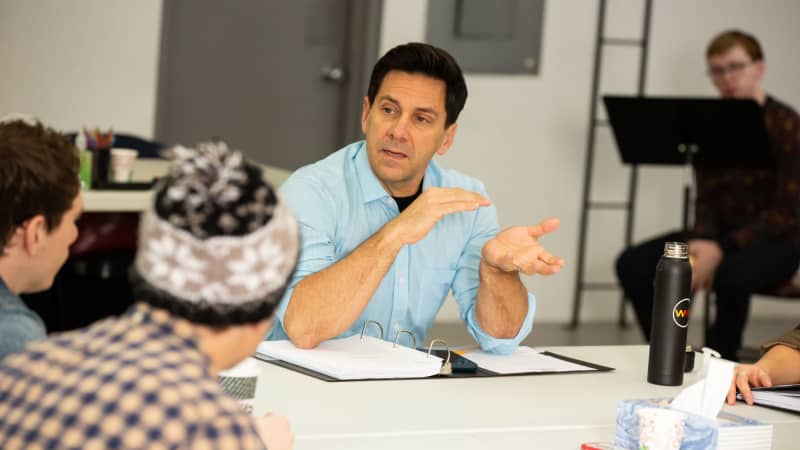Darling Grenadine:
An Interview with Director Michael Berresse
Posted on: January 31, 2020
Education Dramaturg Ted Sod spoke with Michael Berresse about his work on Darling Grenadine.
Ted Sod: Why did you choose to direct and choreograph Darling Grenadine by Daniel Zaitchik? What would you say the musical is about?
Michael Berresse: I love working on all kinds of stories, but I particularly gravitate to ones that explore the balance between light and dark in a very personal, human way. People are endlessly fascinating to me, and our tendency to categorize them based on one aspect of who they are is something I love the opportunity to challenge through my work. And whatever the actual content, I have to be able to understand a writer’s priorities on the page and to feel some creative kinship with them. The more distinct and specific the voice of the writer, the more exciting it is for me to create a three-dimensional world around it. For all those reasons, as soon as I read Darling Grenadine, I knew I wanted to direct the show.
Darling Grenadine touches on many different themes, from ambition and romance to sibling rivalry and addiction. It has the magical, bittersweet aura of contemporary New York City but lives in a place without time or borders. Ultimately, I would say the show is an adult coming-of-age story about the courage to be truly honest, especially with ourselves. Not as simple as it sounds.
TS: How have you been collaborating with Daniel on his musical? How involved are you in the process of rewrites on a new work? How do you make suggestions to a book writer/composer/lyricist for any rewriting you may think necessary?
MB: Because I’m also a writer and an actor, I’ve had the opportunity to be a part of the rewriting process from many sides in my career. The degree of my involvement as a director varies from project to project, depending on the collaboration. Daniel has been very open to my input, and the show has changed significantly since we began working together. Some of the changes have grown out of the deepening of the characters of Louise and Paul and their relationship to Harry. Others have grown out of the need to focus the storytelling point of view or just a renewed perspective based on our creative conversations.
As for how to express my thoughts in a productive way for the writer, it usually involves framing the suggestion in a larger conversation about rhythm, structure, and how it helps clarify a character arc and/or the contract with the audience. Perhaps most important is to demonstrate how the change advances or enhances the author’s original intent.
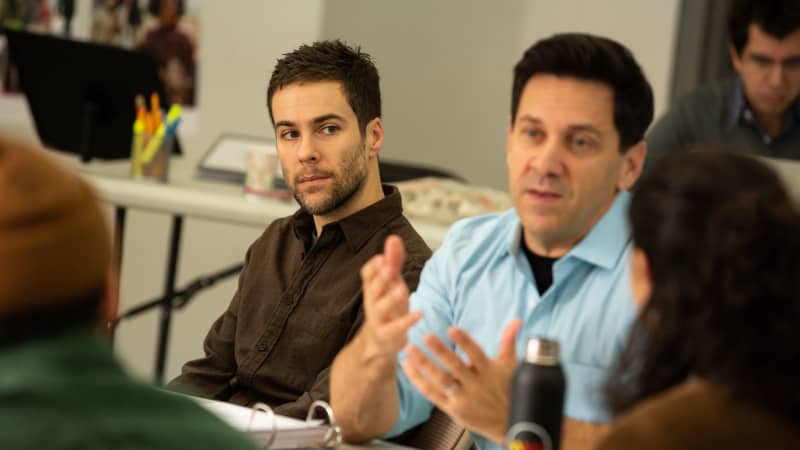
Daniel Zaitchik with Michael Berressee
© Jeremy DanielTS: Will you give us some insight into your process as a director/choreographer? What kind of research did you have to do in order to direct this musical? What kind of atmosphere do you like to create in the rehearsal room? How do you collaborate with actors?
MB: All we have as artists is our own personal experience and the desire to harness and share it. The beauty of collaboration is that it continues to expand the experiences we have to draw on. I started as a dancer, so the way in which a piece moves physically is a major priority, not just choreographically but in terms of the physical spirit of a show. I often focus on transitions and staging patterns early on and how they inform and deepen the experience for the audience.
Also, because all theatre should have a crafted rhythm to it, I’m always considering the “musical” structure of the script and emotional progression, as well as the songs.

Jay Armstrong Johnson with Michael Berresse
© Jeremy DanielI like a happy room, and I tend to wear my heart and opinions on my sleeve. As a director, it’s always a balance between stepping into a project with a clear and personal point of view and staying open to new input along the way. Creating theatre is a complicated process with a huge number of moving parts, so it’s critical that there is an executive authority to help negotiate. It’s also paramount that everyone feels welcome to express their opinion and expose their process in a safe and supportive environment.
As for the actors, it’s about cultivating their personal connection to the characters and material through table work and discussion and then shaping that internal work within the context of the physical production. And because I myself am an actor, it usually helps add another level of communication and trust in the process.
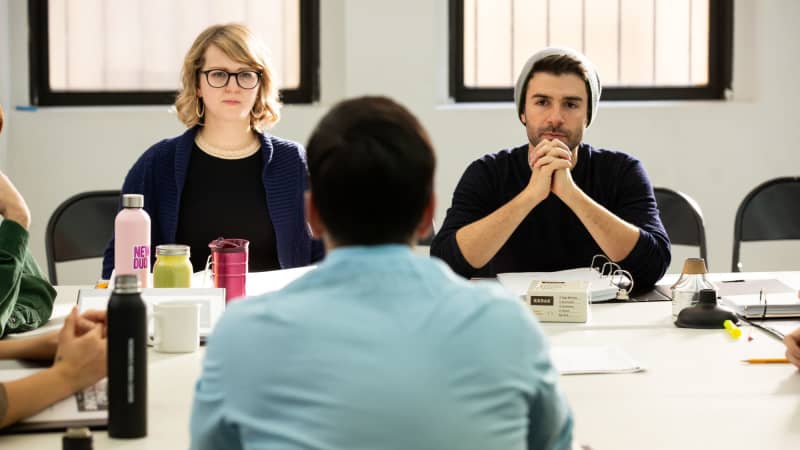
Emily Walton and Adam Kantor with Michael Berressee
© Jeremy DanielTS: How do you understand the relationship between Harry and Louise at this point in the process?
MB: One of the unifying themes of the various relationships in Darling Grenadine is that each of the characters can see the others more clearly than they can see themselves. It’s a large part of what draws them together, whether they understand it or not. I would describe Harry and Louise as being on an unavoidable collision course. In many ways, they are cut from the same cloth, so there is an easy and joyful connection.
But despite their deep and genuine affection for each other, their inability to see themselves clearly makes the relationship more codependent than sustainable or self-aware. Nevertheless, it’s an essential step if they are to change the paths they are stuck on individually.
TS: Another fascinating relationship in the play is between Harry and his brother, Paul. What are your preliminary thoughts about their relationship?
MB: Again, despite their genuine love for each other, Harry and Paul share the same inability or unwillingness to see themselves clearly. And though they have a shared history, in many ways they are oil and water. It’s compounded by the sense of obligation that comes with a complicated family bond and the need to protect it.
TS: What traits did you need in casting the actors? What specifically were you looking for in casting the people who make up the world of Darling Grenadine?
MB: Because these are emotionally complex, very human characters, I looked for actors who had the willingness to expose very personal aspects of themselves through the material. Authenticity and transparency are always desired, of course, and even more critical in a space this small. And because the characters each run the gamut of personality traits, I wanted actors who were as comfortable with joy and comedy as anger and pain.
Additionally, the score is very vocally challenging, Harry has to play piano, and our Man and Woman play a multitude of different characters between them, so those were other considerations.
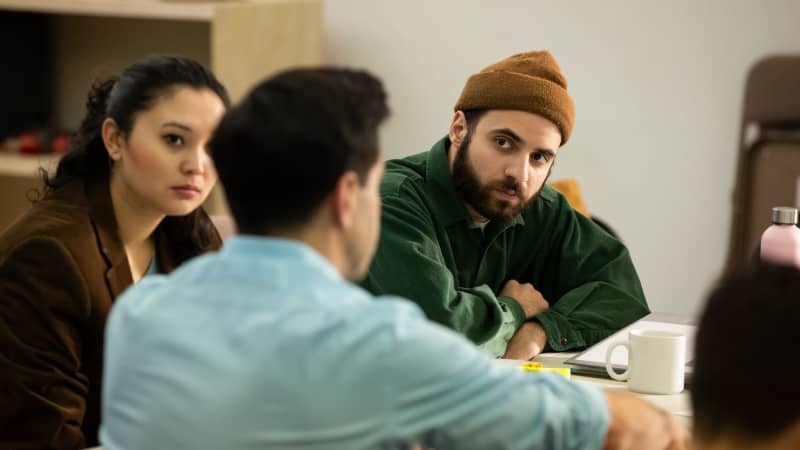
Aury Krebs and Matt Dallal with Michael Berresse
© Jeremy DanielTS: How have you been collaborating with your design team on this production? Can you give us a sense of how your production will manifest itself visually?
MB: I always say that if I’ve done my job really well, at some point in the process everyone in the room should be able to feel whether something belongs in the world of the play or not. I invite designers into the discussion about content and my point of view long before we start looking at actual designs. I love being able to speak specifically about the material and aesthetic and seeing how that sparks their creative instincts. Once there is a general physical world established, we look at the technical possibilities and requirements of how to best execute the storytelling.
Because the space is small, it’s important to me that the production feel immersive and fluid without compromising a real sense of design. There is a sort of low-tech magic to the way Daniel has written the world of Darling Grenadine. Locations change in a moment, and sometimes fantasies bloom into temporary realities. The production will be in the round with four diagonal entrances and a scrim projection wall surrounding the space. The use of color will be spare and specific in all design elements. I really want to focus as much attention on the silhouette of the actors and the material as possible. And of course there are surprises. You’ll have to see the show to find out!
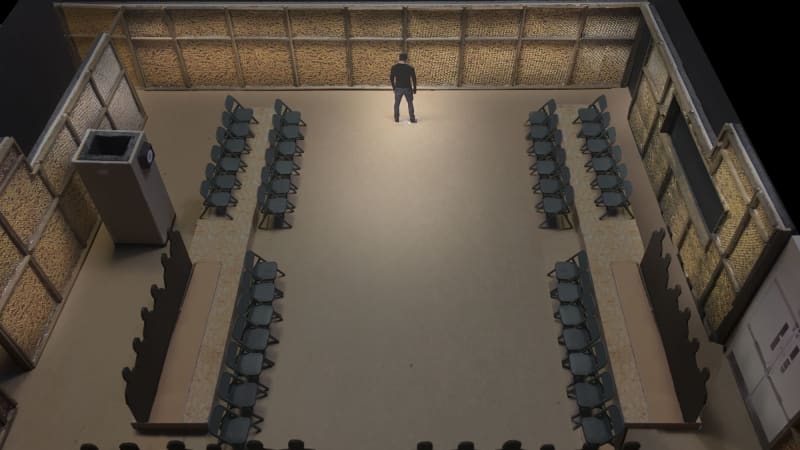
Black Box set model by Arnulfo Maldonado for “Bobbie Clearly”
TS: Where were you born, and where did you get your training? Did you have any teachers who had a profound influence on you as an artist?
MB: I was born in Holyoke, Massachusetts, but by the age of six we had moved to Laguna Niguel in Southern California and again to Joliet, Illinois, where I stayed through my high school years. I was a gymnast and musician for years before I found theatre as a teenager. I started dancing at 16 and began working professionally immediately out of high school. Although I never did a university program, I studied privately throughout my early professional life with Keith Davis, Joan Lader, Suzanne Esper, Gus Giordano, Phil Black, and many others.
TS: What or who inspires you as an artist?
MB: Any number of things. Kindness. Courage. Specificity. Loss. Humor. Rage. I think anyone who is willing to risk judgment or scrutiny, from others and from themselves, in order to bring empathy or education or appreciation or catharsis to the world at large deserves to be celebrated and supported. In a modern world where social reality is largely dominated by media and political gatekeepers, art and artists of every kind are more imperative and potent than ever.
TS: Any advice for young people who want to direct and choreograph for the theatre?
MB: Make it personal. Be generous. Do your homework.
